
modelscope-agent
ModelScope-Agent: An agent framework connecting models in ModelScope with the world
Stars: 2657
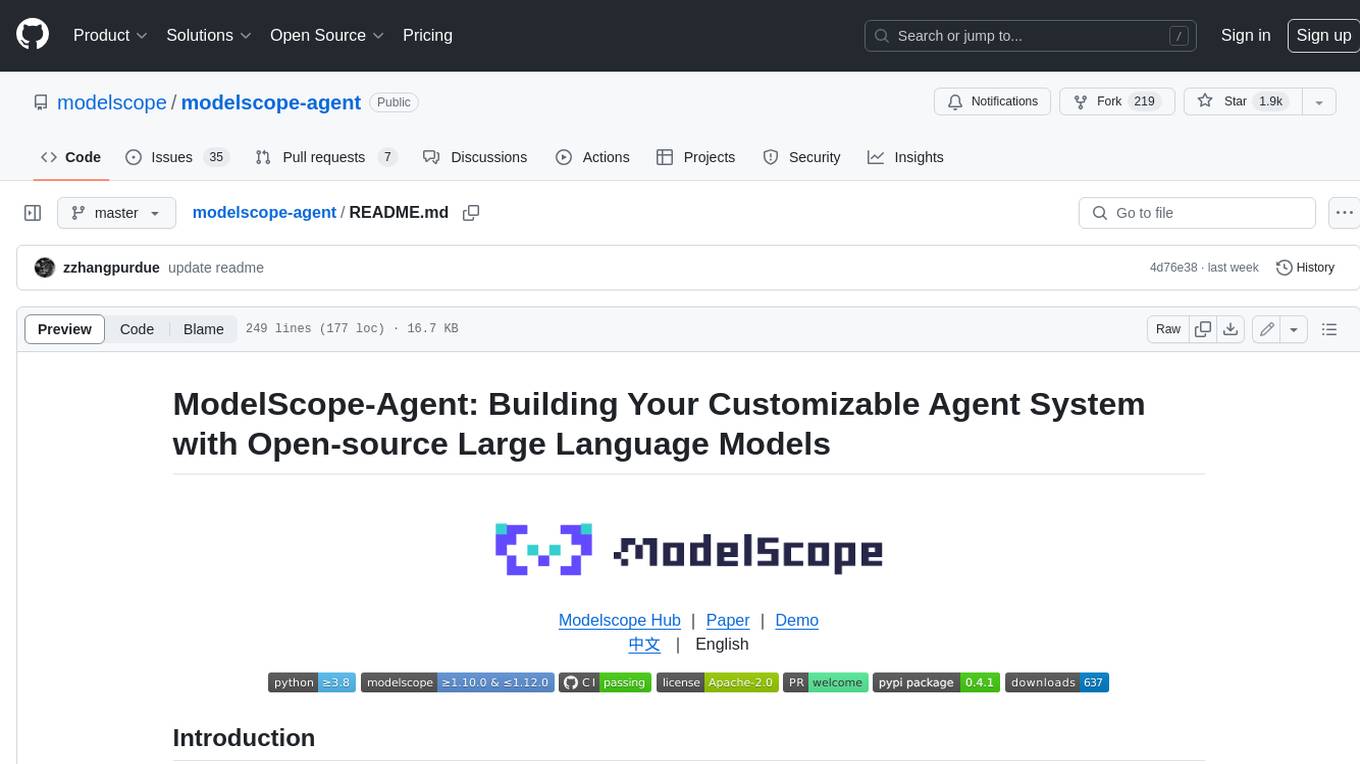
ModelScope-Agent is a customizable and scalable Agent framework. A single agent has abilities such as role-playing, LLM calling, tool usage, planning, and memory. It mainly has the following characteristics: - **Simple Agent Implementation Process**: Simply specify the role instruction, LLM name, and tool name list to implement an Agent application. The framework automatically arranges workflows for tool usage, planning, and memory. - **Rich models and tools**: The framework is equipped with rich LLM interfaces, such as Dashscope and Modelscope model interfaces, OpenAI model interfaces, etc. Built in rich tools, such as **code interpreter**, **weather query**, **text to image**, **web browsing**, etc., make it easy to customize exclusive agents. - **Unified interface and high scalability**: The framework has clear tools and LLM registration mechanism, making it convenient for users to expand more diverse Agent applications. - **Low coupling**: Developers can easily use built-in tools, LLM, memory, and other components without the need to bind higher-level agents.
README:
Modelscope Hub | Paper | Demo
中文  |  English
Modelscope-Agent is a customizable and scalable Agent framework. A single agent has abilities such as role-playing, LLM calling, tool usage, planning, and memory. It mainly has the following characteristics:
- Simple Agent Implementation Process: Simply specify the role instruction, LLM name, and tool name list to implement an Agent application. The framework automatically arranges workflows for tool usage, planning, and memory.
- Rich models and tools: The framework is equipped with rich LLM interfaces, such as Dashscope and Modelscope model interfaces, OpenAI model interfaces, etc. Built in rich tools, such as code interpreter, weather query, text to image, web browsing, etc., make it easy to customize exclusive agents.
- Unified interface and high scalability: The framework has clear tools and LLM registration mechanism, making it convenient for users to expand more diverse Agent applications.
- Low coupling: Developers can easily use built-in tools, LLM, memory, and other components without the need to bind higher-level agents.
- 🔥🔥🔥Aug 8, 2024: A new graph based code generation tool CodexGraph is released by Modelscope-Agent, it has been proved effective and versatile on various code related tasks, please check example.
- 🔥🔥Aug 1, 2024: A high efficient and reliable Data Science Assistant is running on Modelscope-Agent, please find detail in example.
- 🔥July 17, 2024: Parallel tool calling on Modelscope-Agent-Server, please find detail in doc.
- 🔥June 17, 2024: Upgrading RAG flow based on LLama-index, allow user to hybrid search knowledge by different strategies and modalities, please find detail in doc.
- 🔥June 6, 2024: With Modelscope-Agent-Server, Qwen2 could be used by OpenAI SDK with tool calling ability, please find detail in doc.
- 🔥June 4, 2024: Modelscope-Agent supported Mobile-Agent-V2arxiv,based on Android Adb Env, please check in the application.
- 🔥May 17, 2024: Modelscope-Agent supported multi-roles room chat in the gradio.
- May 14, 2024: Modelscope-Agent supported image input in
RolePlayagents with latest OpenAI modelGPT-4o. Developers can experience this feature by specifying theimage_urlparameter. - May 10, 2024: Modelscope-Agent launched a user-friendly
Assistant API, and also provided aTools APIthat executes utilities in isolated, secure containers, please find the document - Apr 12, 2024: The Ray version of multi-agent solution is on modelscope-agent, please find the document
- Mar 15, 2024: Modelscope-Agent and the AgentFabric (opensource version for GPTs) is running on the production environment of modelscope studio.
- Feb 10, 2024: In Chinese New year, we upgrade the modelscope agent to version v0.3 to facilitate developers to customize various types of agents more conveniently through coding and make it easier to make multi-agent demos. For more details, you can refer to #267 and #293 .
- Nov 26, 2023: AgentFabric now supports collaborative use in ModelScope's Creation Space, allowing for the sharing of custom applications in the Creation Space. The update also includes the latest GTE text embedding integration.
- Nov 17, 2023: AgentFabric released, which is an interactive framework to facilitate creation of agents tailored to various real-world applications.
- Oct 30, 2023: Facechain Agent released a local version of the Facechain Agent that can be run locally. For detailed usage instructions, please refer to Facechain Agent.
- Oct 25, 2023: Story Agent released a local version of the Story Agent for generating storybook illustrations. It can be run locally. For detailed usage instructions, please refer to Story Agent.
- Sep 20, 2023: ModelScope GPT offers a local version through gradio that can be run locally. You can navigate to the demo/msgpt/ directory and execute
bash run_msgpt.sh. - Sep 4, 2023: Three demos, demo_qwen, demo_retrieval_agent and demo_register_tool, have been added, along with detailed tutorials provided.
- Sep 2, 2023: The preprint paper associated with this project was published.
- Aug 22, 2023: Support accessing various AI model APIs using ModelScope tokens.
- Aug 7, 2023: The initial version of the modelscope-agent repository was released.
clone repo and install dependency:
git clone https://github.com/modelscope/modelscope-agent.git
cd modelscope-agent && pip install -r requirements.txtThe ModelScope Notebook offers a free-tier that allows ModelScope user to run the FaceChain application with minimum setup, refer to ModelScope Notebook
# Step1: 我的notebook -> PAI-DSW -> GPU环境
# Step2: Download the [demo file](https://github.com/modelscope/modelscope-agent/blob/master/demo/demo_qwen_agent.ipynb) and upload it to the GPU.
# Step3: Execute the demo notebook in order.The agent incorporates an LLM along with task-specific tools, and uses the LLM to determine which tool or tools to invoke in order to complete the user's tasks.
To start, all you need to do is initialize an RolePlay object with corresponding tasks
- This sample code uses the qwen-max model, drawing tools and weather forecast tools.
- Using the qwen-max model requires replacing YOUR_DASHSCOPE_API_KEY in the example with your API-KEY for the code to run properly. YOUR_DASHSCOPE_API_KEY can be obtained here. The drawing tool also calls DASHSCOPE API (wanx), so no additional configuration is required.
- When using the weather forecast tool, you need to replace YOUR_AMAP_TOKEN in the example with your AMAP weather API-KEY so that the code can run normally. YOUR_AMAP_TOKEN is available here.
# 配置环境变量;如果您已经提前将api-key提前配置到您的运行环境中,可以省略这个步骤
import os
os.environ['DASHSCOPE_API_KEY']=YOUR_DASHSCOPE_API_KEY
os.environ['AMAP_TOKEN']=YOUR_AMAP_TOKEN
# 选用RolePlay 配置agent
from modelscope_agent.agents.role_play import RolePlay # NOQA
role_template = '你扮演一个天气预报助手,你需要查询相应地区的天气,并调用给你的画图工具绘制一张城市的图。'
llm_config = {'model': 'qwen-max', 'model_server': 'dashscope'}
# input tool name
function_list = ['amap_weather', 'image_gen']
bot = RolePlay(
function_list=function_list, llm=llm_config, instruction=role_template)
response = bot.run('朝阳区天气怎样?')
text = ''
for chunk in response:
text += chunkResult
- Terminal runs
# 第一次调用llm的输出
Action: amap_weather
Action Input: {"location": "朝阳区"}
# 第二次调用llm的输出
目前,朝阳区的天气状况为阴天,气温为1度。
Action: image_gen
Action Input: {"text": "朝阳区城市风光", "resolution": "1024*1024"}
# 第三次调用llm的输出
目前,朝阳区的天气状况为阴天,气温为1度。同时,我已为你生成了一张朝阳区的城市风光图,如下所示:
An Agent object consists of the following components:
-
LLM: A large language model that is responsible to process your inputs and decide calling tools. -
function_list: A list consists of available tools for agents.
Currently, configuration of Agent may contain following arguments:
-
llm: The llm config of this agent- When Dict: set the config of llm as {'model': '', 'api_key': '', 'model_server': ''}
- When BaseChatModel: llm is sent by another agent
-
function_list: A list of tools- When str: tool names
- When Dict: tool cfg
-
storage_path: If not specified otherwise, all data will be stored here in KV pairs by memory -
instruction: the system instruction of this agent -
name: the name of agent -
description: the description of agent, which is used for multi_agent -
kwargs: other potential parameters
Agent, as a base class, cannot be directly initialized and called. Agent subclasses need to inherit it. They must implement function _run, which mainly includes three parts: generation of messages/propmt, calling of llm(s), and tool calling based on the results of llm. We provide an implement of these components in RolePlay for users, and you can also custom your components according to your requirement.
from modelscope_agent import Agent
class YourCustomAgent(Agent):
def _run(self, user_request, **kwargs):
# Custom your workflowLLM is core module of agent, which ensures the quality of interaction results.
Currently, configuration of `` may contain following arguments:
-
model: The specific model name will be passed directly to the model service provider. -
model_server: provider of model services.
BaseChatModel, as a base class of llm, cannot be directly initialized and called. The subclasses need to inherit it. They must implement function _chat_stream and _chat_no_stream, which correspond to streaming output and non-streaming output respectively.
Optionally implement chat_with_functions and chat_with_raw_prompt for function calling and text completion.
Currently we provide the implementation of three model service providers: dashscope (for qwen series models), zhipu (for glm series models) and openai (for all openai api format models). You can directly use the models supported by the above service providers, or you can customize your llm.
For more information please refer to docs/modules/llm.md
We provide several multi-domain tools that can be configured and used in the agent.
You can also customize your tools with set the tool's name, description, and parameters based on a predefined pattern by inheriting the base tool. Depending on your needs, call() can be implemented. An example of a custom tool is provided in demo_register_new_tool
You can pass the tool name or configuration you want to use to the agent.
# by tool name
function_list = ['amap_weather', 'image_gen']
bot = RolePlay(function_list=function_list, ...)
# by tool configuration
from langchain.tools import ShellTool
function_list = [{'terminal':ShellTool()}]
bot = RolePlay(function_list=function_list, ...)
# by mixture
function_list = ['amap_weather', {'terminal':ShellTool()}]
bot = RolePlay(function_list=function_list, ...)-
image_gen: Wanx Image Generation. DASHSCOPE_API_KEY needs to be configured in the environment variable. -
code_interpreter: Code Interpreter -
web_browser: Web Browsing -
amap_weather: AMAP Weather. AMAP_TOKEN needs to be configured in the environment variable. -
wordart_texture_generation: Word art texture generation. DASHSCOPE_API_KEY needs to be configured in the environment variable. -
web_search: Web Searching. [] -
qwen_vl: Qwen-VL image recognition. DASHSCOPE_API_KEY needs to be configured in the environment variable. -
style_repaint: Character style redrawn. DASHSCOPE_API_KEY needs to be configured in the environment variable. -
image_enhancement: Chasing shadow-magnifying glass. DASHSCOPE_API_KEY needs to be configured in the environment variable. -
text-address: Geocoding. MODELSCOPE_API_TOKEN needs to be configured in the environment variable. -
speech-generation: Speech generation. MODELSCOPE_API_TOKEN needs to be configured in the environment variable. -
video-generation: Video generation. MODELSCOPE_API_TOKEN needs to be configured in the environment variable.
Please refer the multi-agent readme.
If you would like to learn more about the practical details of Agent, you can refer to our articles and video tutorials:
We appreciate your enthusiasm in participating in our open-source ModelScope-Agent project. If you encounter any issues, please feel free to report them to us. If you have built a new Agent demo and are ready to share your work with us, please create a pull request at any time! If you need any further assistance, please contact us via email at [email protected] or communication group!
Facechain is an open-source project for generating personalized portraits in various styles using facial images uploaded by users. By integrating the capabilities of Facechain into the modelscope-agent framework, we have greatly simplified the usage process. The generation of personalized portraits can now be done through dialogue with the Facechain Agent.
FaceChainAgent Studio Application Link: https://modelscope.cn/studios/CVstudio/facechain_agent_studio/summary
You can run it directly in a notebook/Colab/local environment: https://www.modelscope.cn/my/mynotebook
! git clone -b feat/facechain_agent https://github.com/modelscope/modelscope-agent.git
! cd modelscope-agent && ! pip install -r requirements.txt
! cd modelscope-agent/demo/facechain_agent/demo/facechain_agent && ! pip install -r requirements.txt
! pip install http://dashscope-cn-beijing.oss-cn-beijing.aliyuncs.com/zhicheng/modelscope_agent-0.1.0-py3-none-any.whl
! PYTHONPATH=/mnt/workspace/modelscope-agent/demo/facechain_agent && cd modelscope-agent/demo/facechain_agent/demo/facechain_agent && python app_v1.0.py
This project is licensed under the Apache License (Version 2.0).
For Tasks:
Click tags to check more tools for each tasksFor Jobs:
Alternative AI tools for modelscope-agent
Similar Open Source Tools

modelscope-agent
ModelScope-Agent is a customizable and scalable Agent framework. A single agent has abilities such as role-playing, LLM calling, tool usage, planning, and memory. It mainly has the following characteristics: - **Simple Agent Implementation Process**: Simply specify the role instruction, LLM name, and tool name list to implement an Agent application. The framework automatically arranges workflows for tool usage, planning, and memory. - **Rich models and tools**: The framework is equipped with rich LLM interfaces, such as Dashscope and Modelscope model interfaces, OpenAI model interfaces, etc. Built in rich tools, such as **code interpreter**, **weather query**, **text to image**, **web browsing**, etc., make it easy to customize exclusive agents. - **Unified interface and high scalability**: The framework has clear tools and LLM registration mechanism, making it convenient for users to expand more diverse Agent applications. - **Low coupling**: Developers can easily use built-in tools, LLM, memory, and other components without the need to bind higher-level agents.
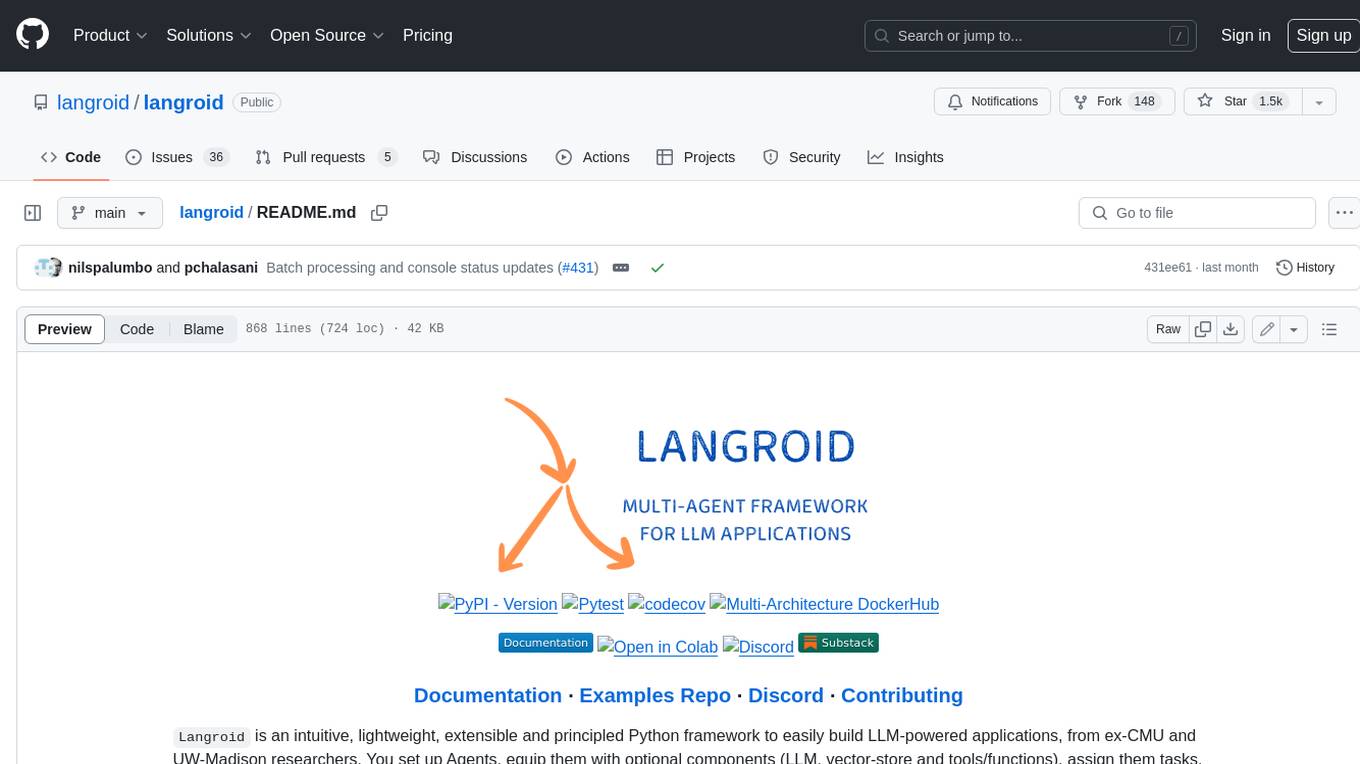
langroid
Langroid is a Python framework that makes it easy to build LLM-powered applications. It uses a multi-agent paradigm inspired by the Actor Framework, where you set up Agents, equip them with optional components (LLM, vector-store and tools/functions), assign them tasks, and have them collaboratively solve a problem by exchanging messages. Langroid is a fresh take on LLM app-development, where considerable thought has gone into simplifying the developer experience; it does not use Langchain.
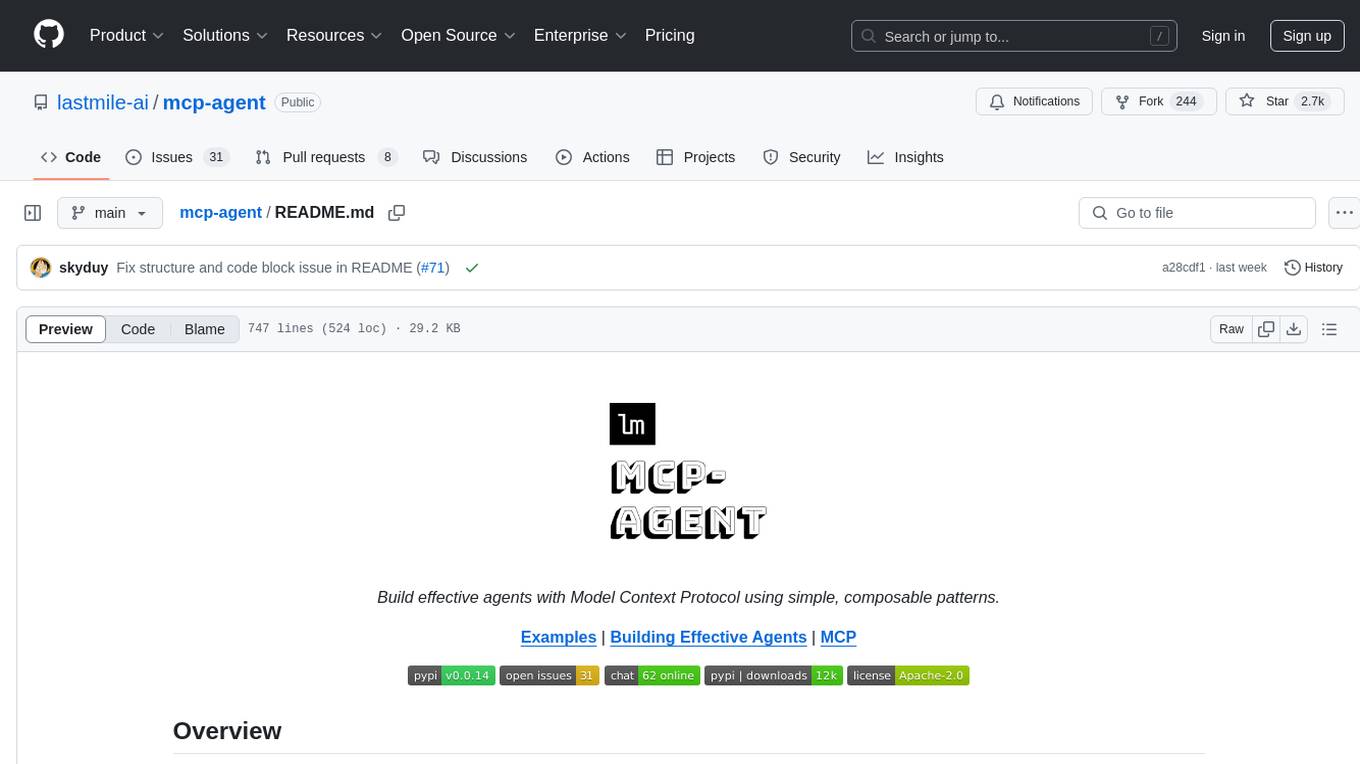
mcp-agent
mcp-agent is a simple, composable framework designed to build agents using the Model Context Protocol. It handles the lifecycle of MCP server connections and implements patterns for building production-ready AI agents in a composable way. The framework also includes OpenAI's Swarm pattern for multi-agent orchestration in a model-agnostic manner, making it the simplest way to build robust agent applications. It is purpose-built for the shared protocol MCP, lightweight, and closer to an agent pattern library than a framework. mcp-agent allows developers to focus on the core business logic of their AI applications by handling mechanics such as server connections, working with LLMs, and supporting external signals like human input.
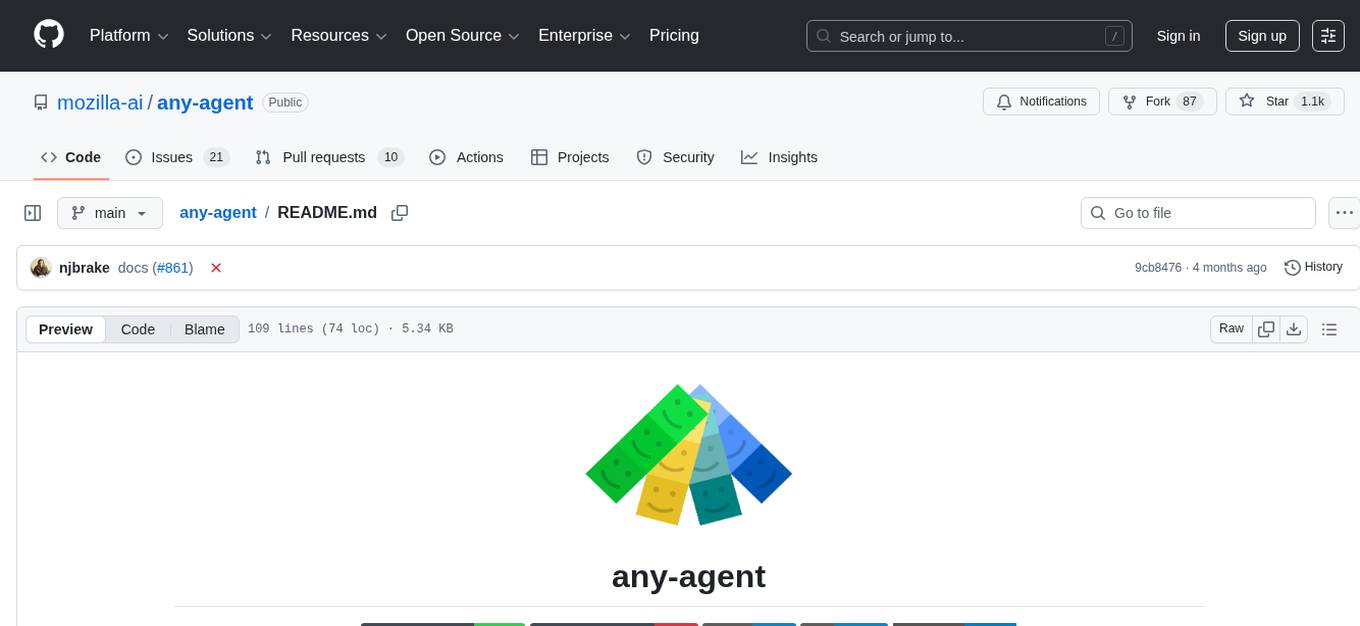
any-agent
Any-agent is a tool that provides a single interface to use and evaluate different agent frameworks. It supports various frameworks like TinyAgent, Google ADK, LangChain, LlamaIndex, OpenAI Agents, Smolagents, and Agno AI. Users can define agent systems using the tool and access practical examples for creating agents, agent evaluations, using callbacks, integrating Model Context Protocol tools, deploying agents with Agent-to-Agent communication, and building Multi-Agent Systems with A2A. Contributions for new frameworks and features are welcome.
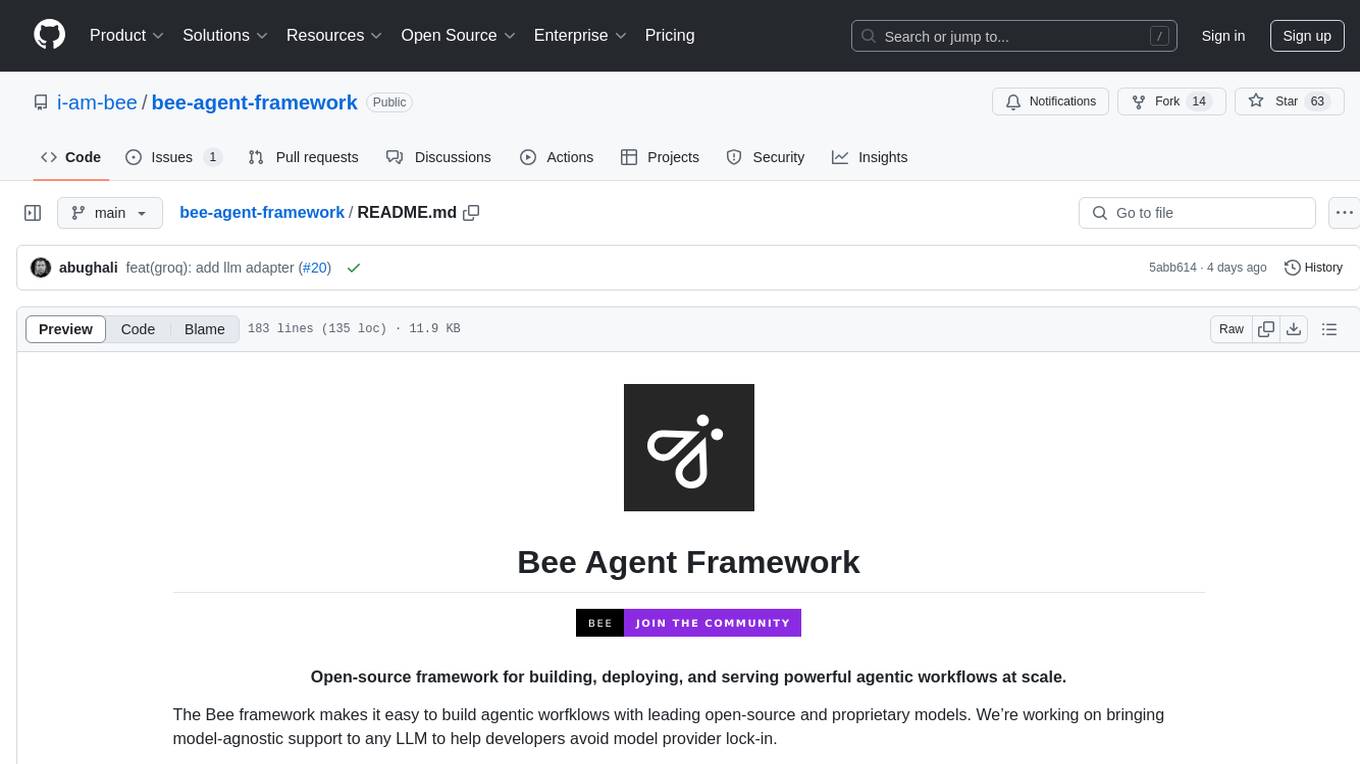
bee-agent-framework
The Bee Agent Framework is an open-source tool for building, deploying, and serving powerful agentic workflows at scale. It provides AI agents, tools for creating workflows in Javascript/Python, a code interpreter, memory optimization strategies, serialization for pausing/resuming workflows, traceability features, production-level control, and upcoming features like model-agnostic support and a chat UI. The framework offers various modules for agents, llms, memory, tools, caching, errors, adapters, logging, serialization, and more, with a roadmap including MLFlow integration, JSON support, structured outputs, chat client, base agent improvements, guardrails, and evaluation.
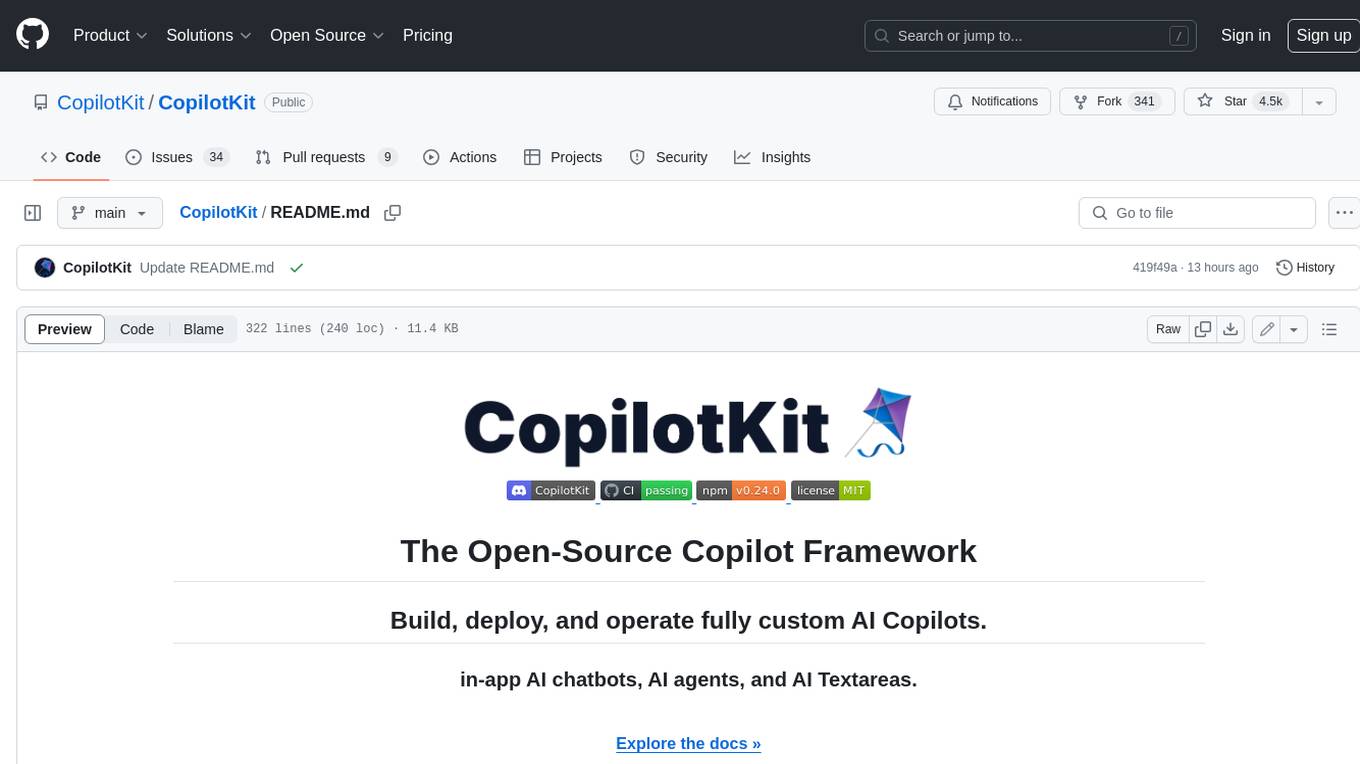
CopilotKit
CopilotKit is an open-source framework for building, deploying, and operating fully custom AI Copilots, including in-app AI chatbots, AI agents, and AI Textareas. It provides a set of components and entry points that allow developers to easily integrate AI capabilities into their applications. CopilotKit is designed to be flexible and extensible, so developers can tailor it to their specific needs. It supports a variety of use cases, including providing app-aware AI chatbots that can interact with the application state and take action, drop-in replacements for textareas with AI-assisted text generation, and in-app agents that can access real-time application context and take action within the application.

cognee
Cognee is an open-source framework designed for creating self-improving deterministic outputs for Large Language Models (LLMs) using graphs, LLMs, and vector retrieval. It provides a platform for AI engineers to enhance their models and generate more accurate results. Users can leverage Cognee to add new information, utilize LLMs for knowledge creation, and query the system for relevant knowledge. The tool supports various LLM providers and offers flexibility in adding different data types, such as text files or directories. Cognee aims to streamline the process of working with LLMs and improving AI models for better performance and efficiency.
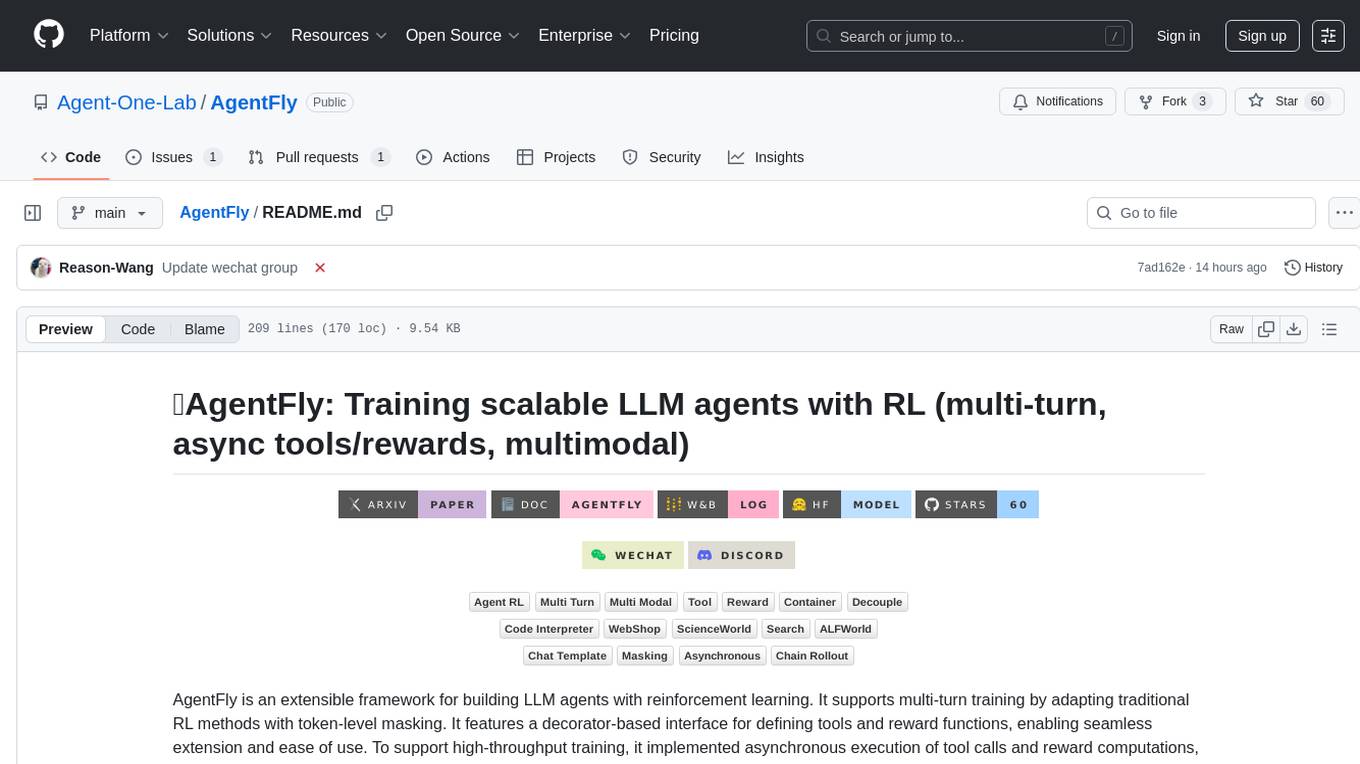
AgentFly
AgentFly is an extensible framework for building LLM agents with reinforcement learning. It supports multi-turn training by adapting traditional RL methods with token-level masking. It features a decorator-based interface for defining tools and reward functions, enabling seamless extension and ease of use. To support high-throughput training, it implemented asynchronous execution of tool calls and reward computations, and designed a centralized resource management system for scalable environment coordination. A suite of prebuilt tools and environments are provided.

mlflow
MLflow is a platform to streamline machine learning development, including tracking experiments, packaging code into reproducible runs, and sharing and deploying models. MLflow offers a set of lightweight APIs that can be used with any existing machine learning application or library (TensorFlow, PyTorch, XGBoost, etc), wherever you currently run ML code (e.g. in notebooks, standalone applications or the cloud). MLflow's current components are:
* `MLflow Tracking
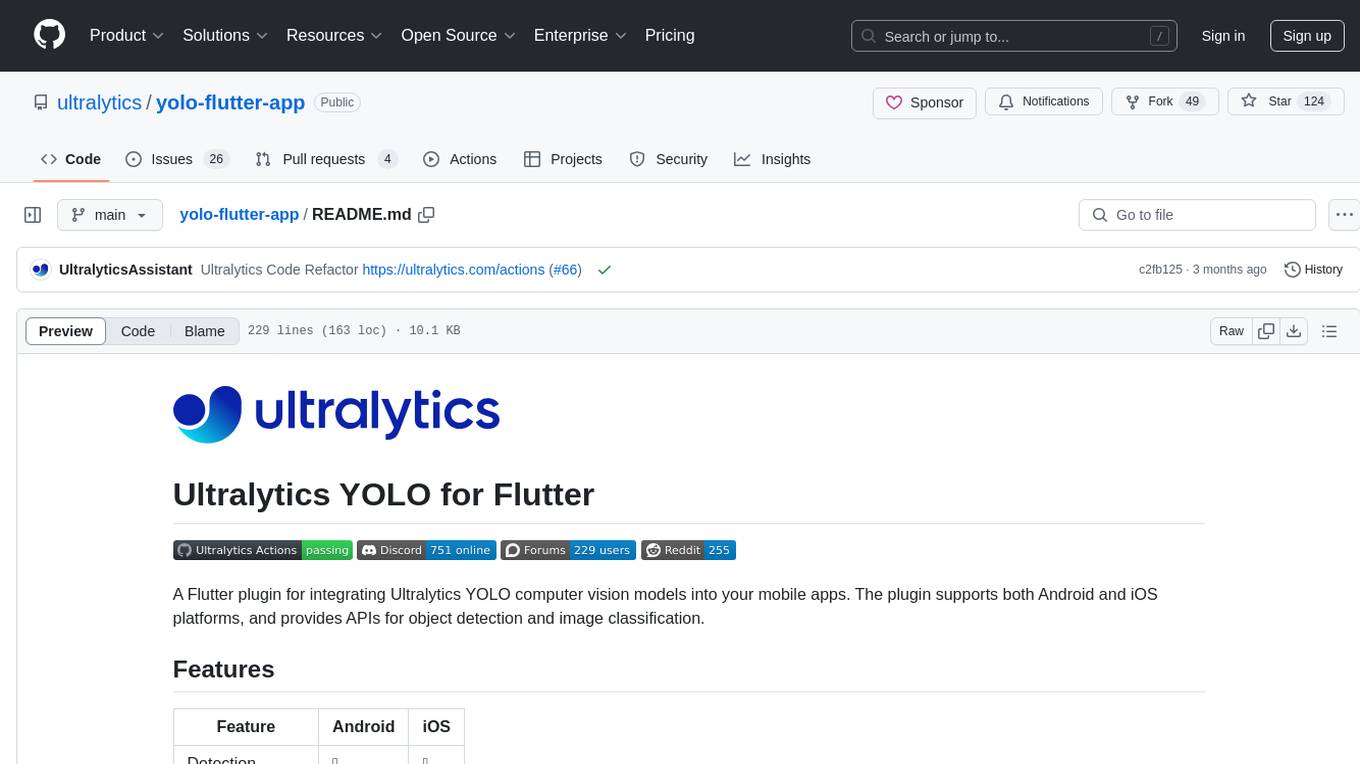
yolo-flutter-app
Ultralytics YOLO for Flutter is a Flutter plugin that allows you to integrate Ultralytics YOLO computer vision models into your mobile apps. It supports both Android and iOS platforms, providing APIs for object detection and image classification. The plugin leverages Flutter Platform Channels for seamless communication between the client and host, handling all processing natively. Before using the plugin, you need to export the required models in `.tflite` and `.mlmodel` formats. The plugin provides support for tasks like detection and classification, with specific instructions for Android and iOS platforms. It also includes features like camera preview and methods for object detection and image classification on images. Ultralytics YOLO thrives on community collaboration and offers different licensing paths for open-source and commercial use cases.
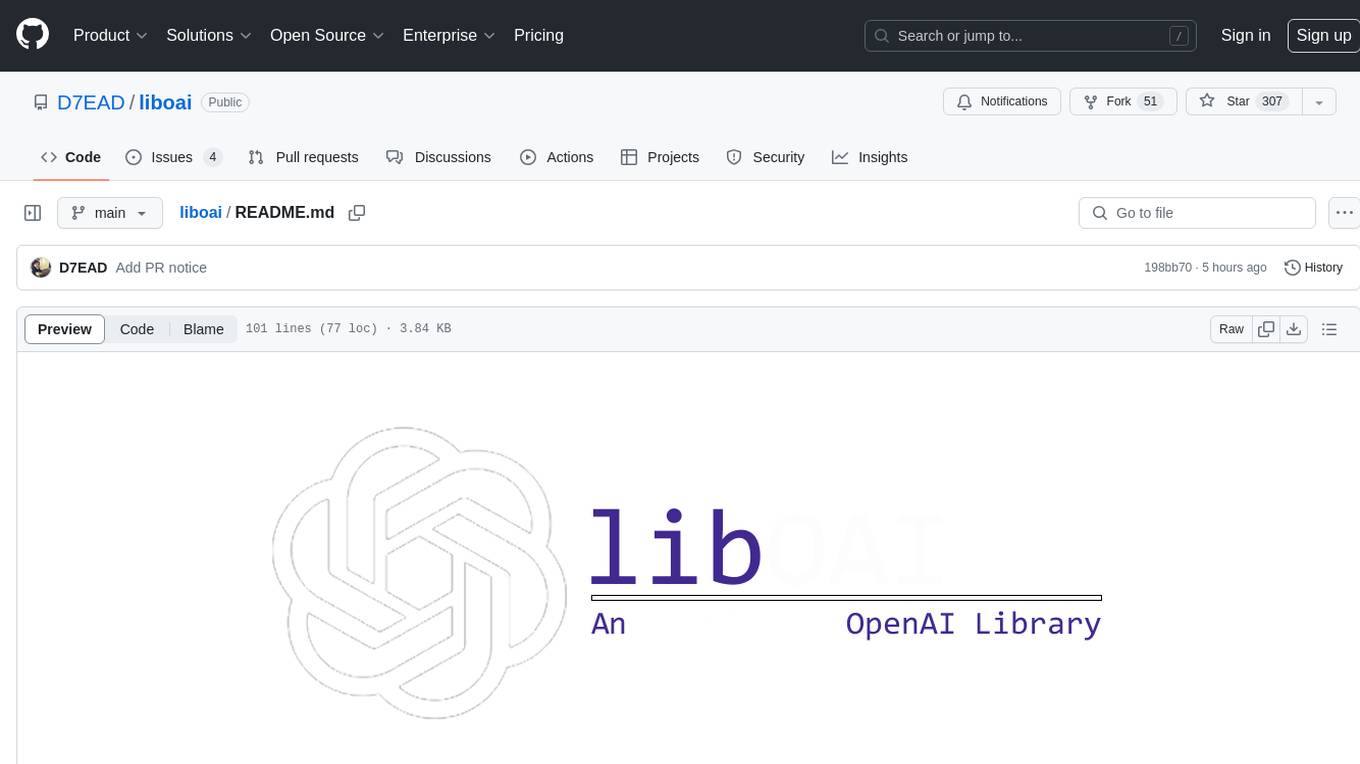
liboai
liboai is a simple C++17 library for the OpenAI API, providing developers with access to OpenAI endpoints through a collection of methods and classes. It serves as a spiritual port of OpenAI's Python library, 'openai', with similar structure and features. The library supports various functionalities such as ChatGPT, Audio, Azure, Functions, Image DALL·E, Models, Completions, Edit, Embeddings, Files, Fine-tunes, Moderation, and Asynchronous Support. Users can easily integrate the library into their C++ projects to interact with OpenAI services.

anything-llm
AnythingLLM is a full-stack application that enables you to turn any document, resource, or piece of content into context that any LLM can use as references during chatting. This application allows you to pick and choose which LLM or Vector Database you want to use as well as supporting multi-user management and permissions.
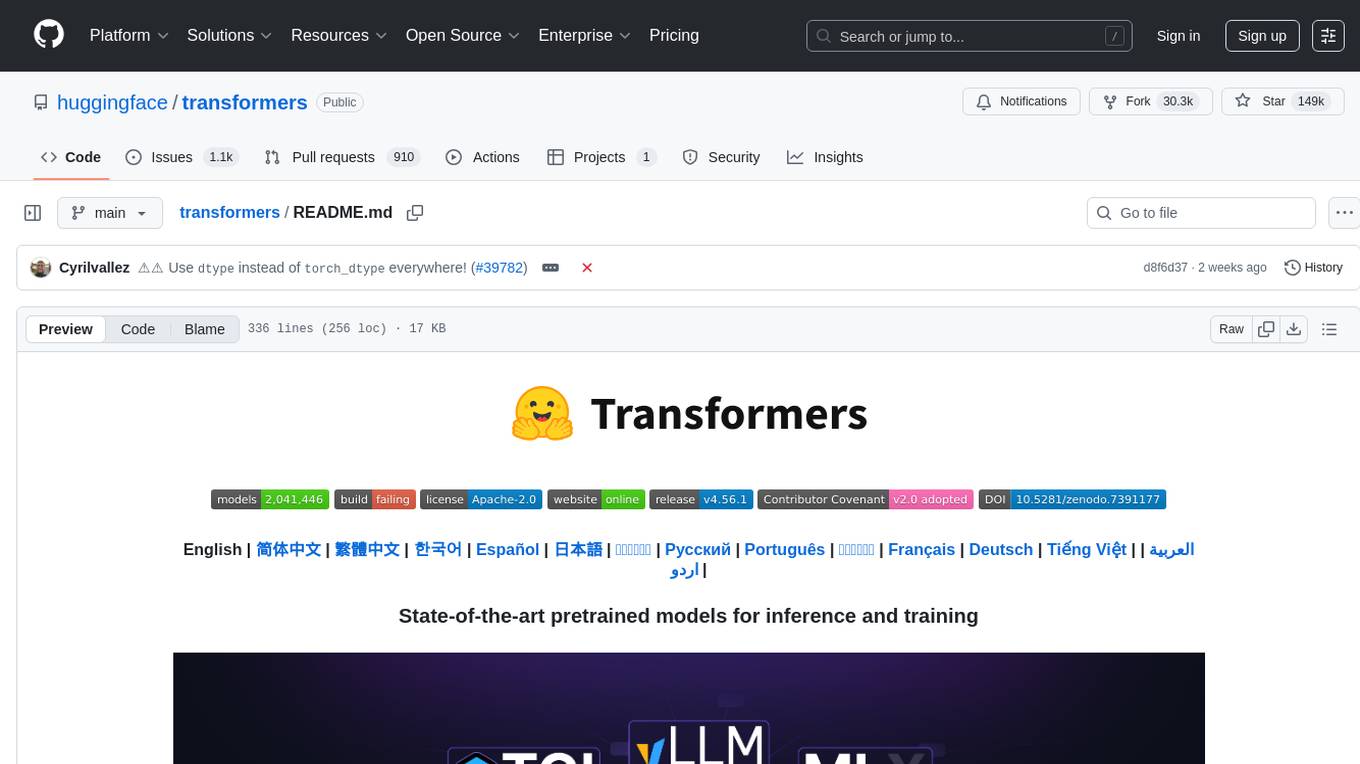
transformers
Transformers is a state-of-the-art pretrained models library that acts as the model-definition framework for machine learning models in text, computer vision, audio, video, and multimodal tasks. It centralizes model definition for compatibility across various training frameworks, inference engines, and modeling libraries. The library simplifies the usage of new models by providing simple, customizable, and efficient model definitions. With over 1M+ Transformers model checkpoints available, users can easily find and utilize models for their tasks.
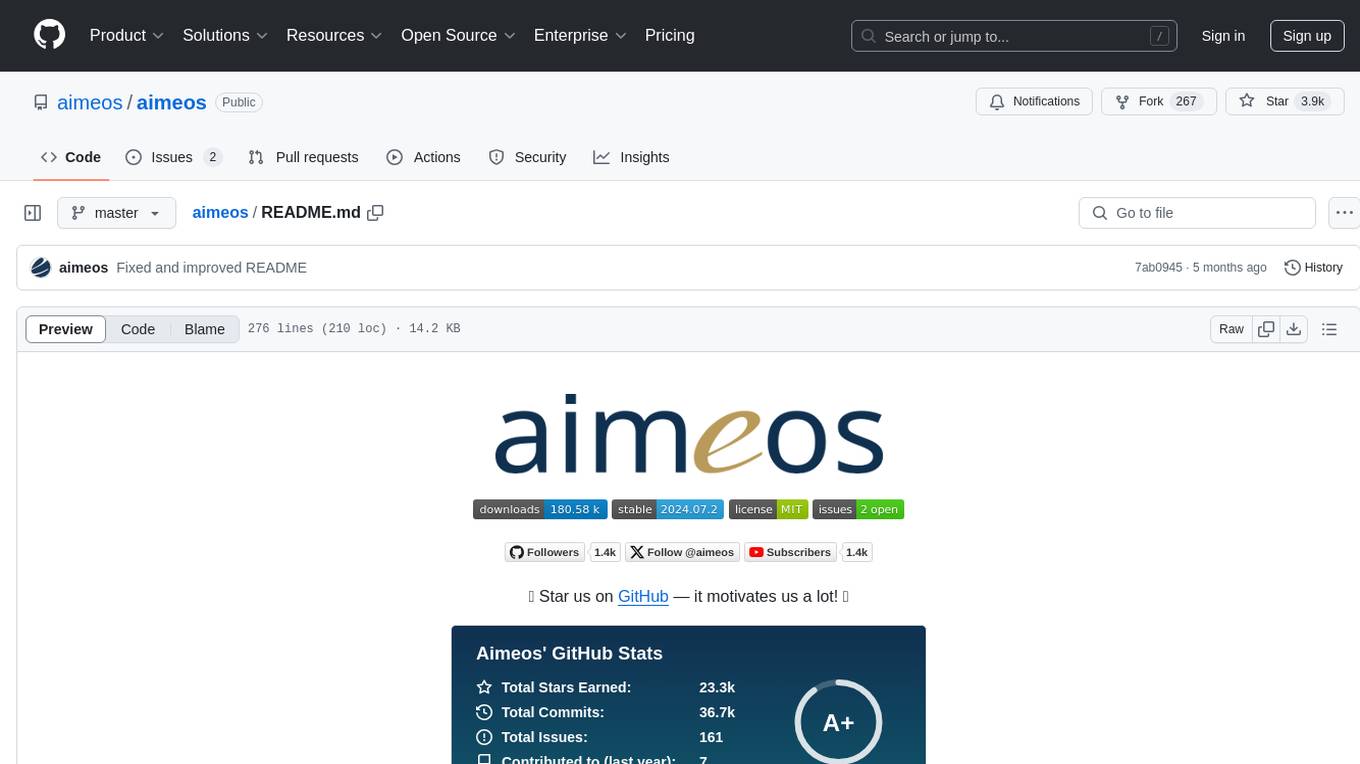
aimeos
Aimeos is a full-featured e-commerce platform that is ultra-fast, cloud-native, and API-first. It offers a wide range of features including JSON REST API, GraphQL API, multi-vendor support, various product types, subscriptions, multiple payment gateways, admin backend, modular structure, SEO optimization, multi-language support, AI-based text translation, mobile optimization, and high-quality source code. It is highly configurable and extensible, making it suitable for e-commerce SaaS solutions, marketplaces, and various cloud environments. Aimeos is designed for scalability, security, and performance, catering to a diverse range of e-commerce needs.
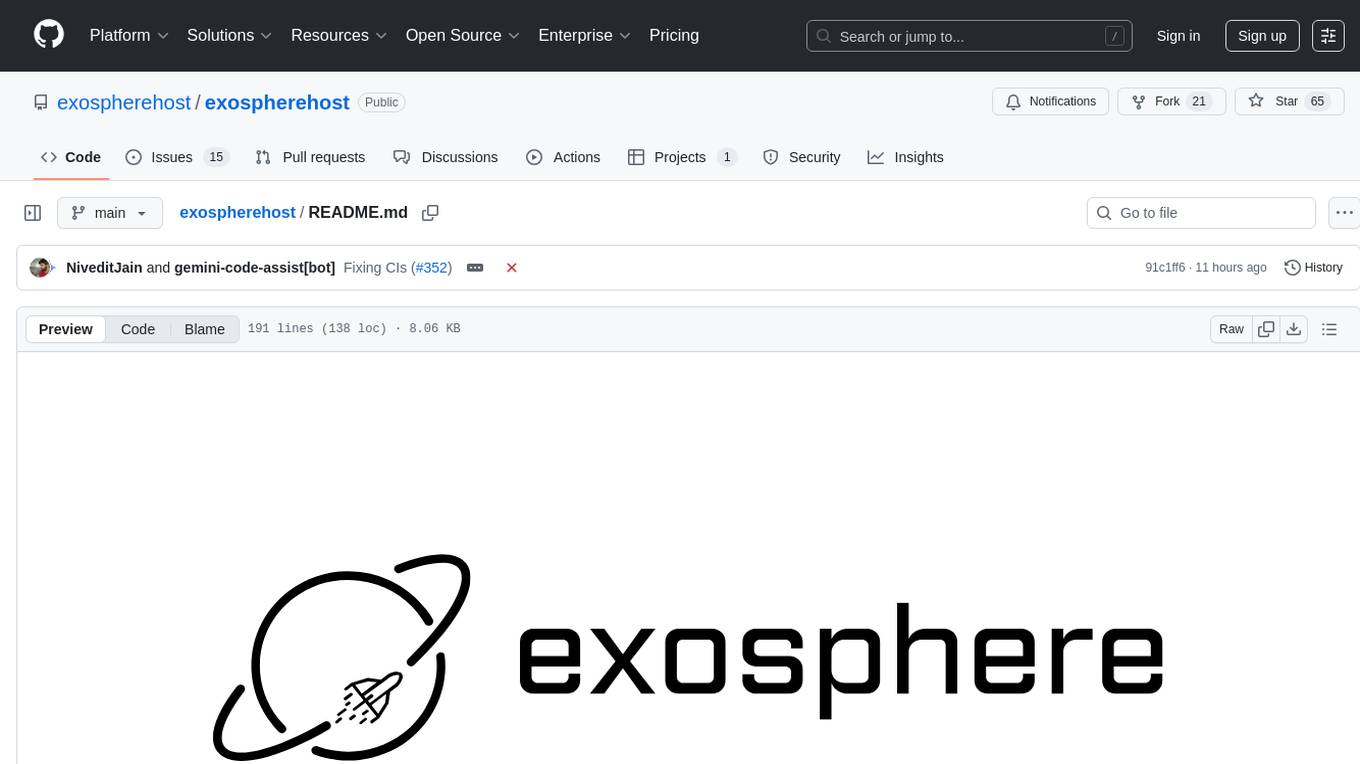
exospherehost
Exosphere is an open source infrastructure designed to run AI agents at scale for large data and long running flows. It allows developers to define plug and playable nodes that can be run on a reliable backbone in the form of a workflow, with features like dynamic state creation at runtime, infinite parallel agents, persistent state management, and failure handling. This enables the deployment of production agents that can scale beautifully to build robust autonomous AI workflows.
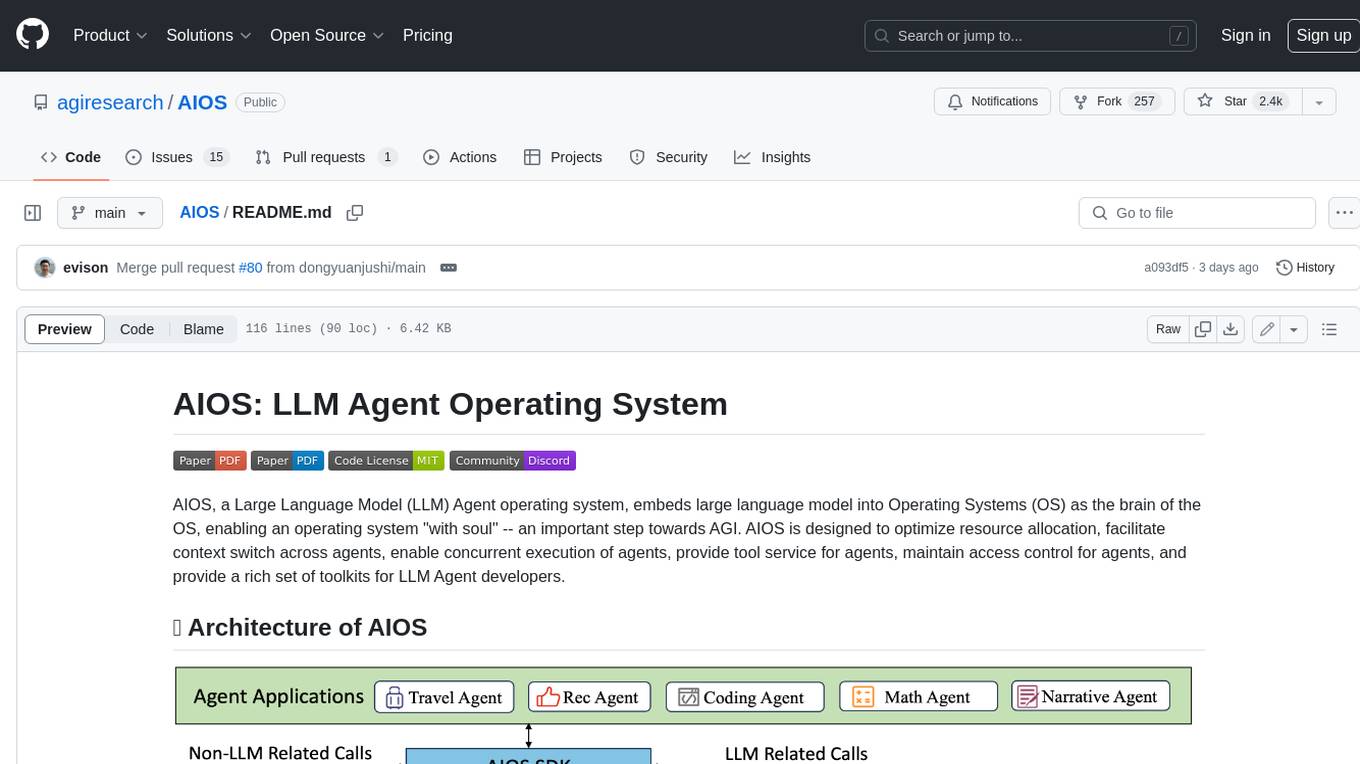
AIOS
AIOS, a Large Language Model (LLM) Agent operating system, embeds large language model into Operating Systems (OS) as the brain of the OS, enabling an operating system "with soul" -- an important step towards AGI. AIOS is designed to optimize resource allocation, facilitate context switch across agents, enable concurrent execution of agents, provide tool service for agents, maintain access control for agents, and provide a rich set of toolkits for LLM Agent developers.
For similar tasks

LLMStack
LLMStack is a no-code platform for building generative AI agents, workflows, and chatbots. It allows users to connect their own data, internal tools, and GPT-powered models without any coding experience. LLMStack can be deployed to the cloud or on-premise and can be accessed via HTTP API or triggered from Slack or Discord.

ai-guide
This guide is dedicated to Large Language Models (LLMs) that you can run on your home computer. It assumes your PC is a lower-end, non-gaming setup.

onnxruntime-genai
ONNX Runtime Generative AI is a library that provides the generative AI loop for ONNX models, including inference with ONNX Runtime, logits processing, search and sampling, and KV cache management. Users can call a high level `generate()` method, or run each iteration of the model in a loop. It supports greedy/beam search and TopP, TopK sampling to generate token sequences, has built in logits processing like repetition penalties, and allows for easy custom scoring.

jupyter-ai
Jupyter AI connects generative AI with Jupyter notebooks. It provides a user-friendly and powerful way to explore generative AI models in notebooks and improve your productivity in JupyterLab and the Jupyter Notebook. Specifically, Jupyter AI offers: * An `%%ai` magic that turns the Jupyter notebook into a reproducible generative AI playground. This works anywhere the IPython kernel runs (JupyterLab, Jupyter Notebook, Google Colab, Kaggle, VSCode, etc.). * A native chat UI in JupyterLab that enables you to work with generative AI as a conversational assistant. * Support for a wide range of generative model providers, including AI21, Anthropic, AWS, Cohere, Gemini, Hugging Face, NVIDIA, and OpenAI. * Local model support through GPT4All, enabling use of generative AI models on consumer grade machines with ease and privacy.

khoj
Khoj is an open-source, personal AI assistant that extends your capabilities by creating always-available AI agents. You can share your notes and documents to extend your digital brain, and your AI agents have access to the internet, allowing you to incorporate real-time information. Khoj is accessible on Desktop, Emacs, Obsidian, Web, and Whatsapp, and you can share PDF, markdown, org-mode, notion files, and GitHub repositories. You'll get fast, accurate semantic search on top of your docs, and your agents can create deeply personal images and understand your speech. Khoj is self-hostable and always will be.

langchain_dart
LangChain.dart is a Dart port of the popular LangChain Python framework created by Harrison Chase. LangChain provides a set of ready-to-use components for working with language models and a standard interface for chaining them together to formulate more advanced use cases (e.g. chatbots, Q&A with RAG, agents, summarization, extraction, etc.). The components can be grouped into a few core modules: * **Model I/O:** LangChain offers a unified API for interacting with various LLM providers (e.g. OpenAI, Google, Mistral, Ollama, etc.), allowing developers to switch between them with ease. Additionally, it provides tools for managing model inputs (prompt templates and example selectors) and parsing the resulting model outputs (output parsers). * **Retrieval:** assists in loading user data (via document loaders), transforming it (with text splitters), extracting its meaning (using embedding models), storing (in vector stores) and retrieving it (through retrievers) so that it can be used to ground the model's responses (i.e. Retrieval-Augmented Generation or RAG). * **Agents:** "bots" that leverage LLMs to make informed decisions about which available tools (such as web search, calculators, database lookup, etc.) to use to accomplish the designated task. The different components can be composed together using the LangChain Expression Language (LCEL).

danswer
Danswer is an open-source Gen-AI Chat and Unified Search tool that connects to your company's docs, apps, and people. It provides a Chat interface and plugs into any LLM of your choice. Danswer can be deployed anywhere and for any scale - on a laptop, on-premise, or to cloud. Since you own the deployment, your user data and chats are fully in your own control. Danswer is MIT licensed and designed to be modular and easily extensible. The system also comes fully ready for production usage with user authentication, role management (admin/basic users), chat persistence, and a UI for configuring Personas (AI Assistants) and their Prompts. Danswer also serves as a Unified Search across all common workplace tools such as Slack, Google Drive, Confluence, etc. By combining LLMs and team specific knowledge, Danswer becomes a subject matter expert for the team. Imagine ChatGPT if it had access to your team's unique knowledge! It enables questions such as "A customer wants feature X, is this already supported?" or "Where's the pull request for feature Y?"

infinity
Infinity is an AI-native database designed for LLM applications, providing incredibly fast full-text and vector search capabilities. It supports a wide range of data types, including vectors, full-text, and structured data, and offers a fused search feature that combines multiple embeddings and full text. Infinity is easy to use, with an intuitive Python API and a single-binary architecture that simplifies deployment. It achieves high performance, with 0.1 milliseconds query latency on million-scale vector datasets and up to 15K QPS.
For similar jobs

h2ogpt
h2oGPT is an Apache V2 open-source project that allows users to query and summarize documents or chat with local private GPT LLMs. It features a private offline database of any documents (PDFs, Excel, Word, Images, Video Frames, Youtube, Audio, Code, Text, MarkDown, etc.), a persistent database (Chroma, Weaviate, or in-memory FAISS) using accurate embeddings (instructor-large, all-MiniLM-L6-v2, etc.), and efficient use of context using instruct-tuned LLMs (no need for LangChain's few-shot approach). h2oGPT also offers parallel summarization and extraction, reaching an output of 80 tokens per second with the 13B LLaMa2 model, HYDE (Hypothetical Document Embeddings) for enhanced retrieval based upon LLM responses, a variety of models supported (LLaMa2, Mistral, Falcon, Vicuna, WizardLM. With AutoGPTQ, 4-bit/8-bit, LORA, etc.), GPU support from HF and LLaMa.cpp GGML models, and CPU support using HF, LLaMa.cpp, and GPT4ALL models. Additionally, h2oGPT provides Attention Sinks for arbitrarily long generation (LLaMa-2, Mistral, MPT, Pythia, Falcon, etc.), a UI or CLI with streaming of all models, the ability to upload and view documents through the UI (control multiple collaborative or personal collections), Vision Models LLaVa, Claude-3, Gemini-Pro-Vision, GPT-4-Vision, Image Generation Stable Diffusion (sdxl-turbo, sdxl) and PlaygroundAI (playv2), Voice STT using Whisper with streaming audio conversion, Voice TTS using MIT-Licensed Microsoft Speech T5 with multiple voices and Streaming audio conversion, Voice TTS using MPL2-Licensed TTS including Voice Cloning and Streaming audio conversion, AI Assistant Voice Control Mode for hands-free control of h2oGPT chat, Bake-off UI mode against many models at the same time, Easy Download of model artifacts and control over models like LLaMa.cpp through the UI, Authentication in the UI by user/password via Native or Google OAuth, State Preservation in the UI by user/password, Linux, Docker, macOS, and Windows support, Easy Windows Installer for Windows 10 64-bit (CPU/CUDA), Easy macOS Installer for macOS (CPU/M1/M2), Inference Servers support (oLLaMa, HF TGI server, vLLM, Gradio, ExLLaMa, Replicate, OpenAI, Azure OpenAI, Anthropic), OpenAI-compliant, Server Proxy API (h2oGPT acts as drop-in-replacement to OpenAI server), Python client API (to talk to Gradio server), JSON Mode with any model via code block extraction. Also supports MistralAI JSON mode, Claude-3 via function calling with strict Schema, OpenAI via JSON mode, and vLLM via guided_json with strict Schema, Web-Search integration with Chat and Document Q/A, Agents for Search, Document Q/A, Python Code, CSV frames (Experimental, best with OpenAI currently), Evaluate performance using reward models, and Quality maintained with over 1000 unit and integration tests taking over 4 GPU-hours.

mistral.rs
Mistral.rs is a fast LLM inference platform written in Rust. We support inference on a variety of devices, quantization, and easy-to-use application with an Open-AI API compatible HTTP server and Python bindings.
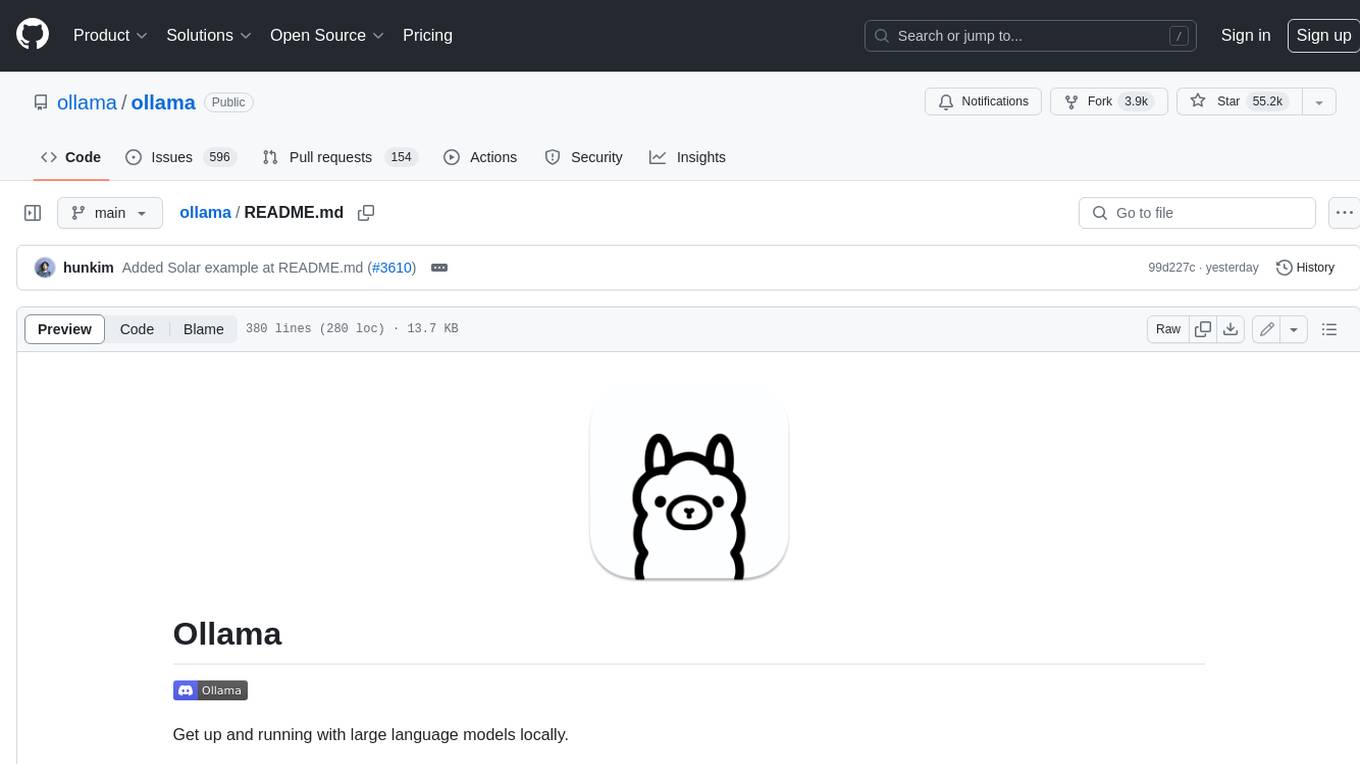
ollama
Ollama is a lightweight, extensible framework for building and running language models on the local machine. It provides a simple API for creating, running, and managing models, as well as a library of pre-built models that can be easily used in a variety of applications. Ollama is designed to be easy to use and accessible to developers of all levels. It is open source and available for free on GitHub.
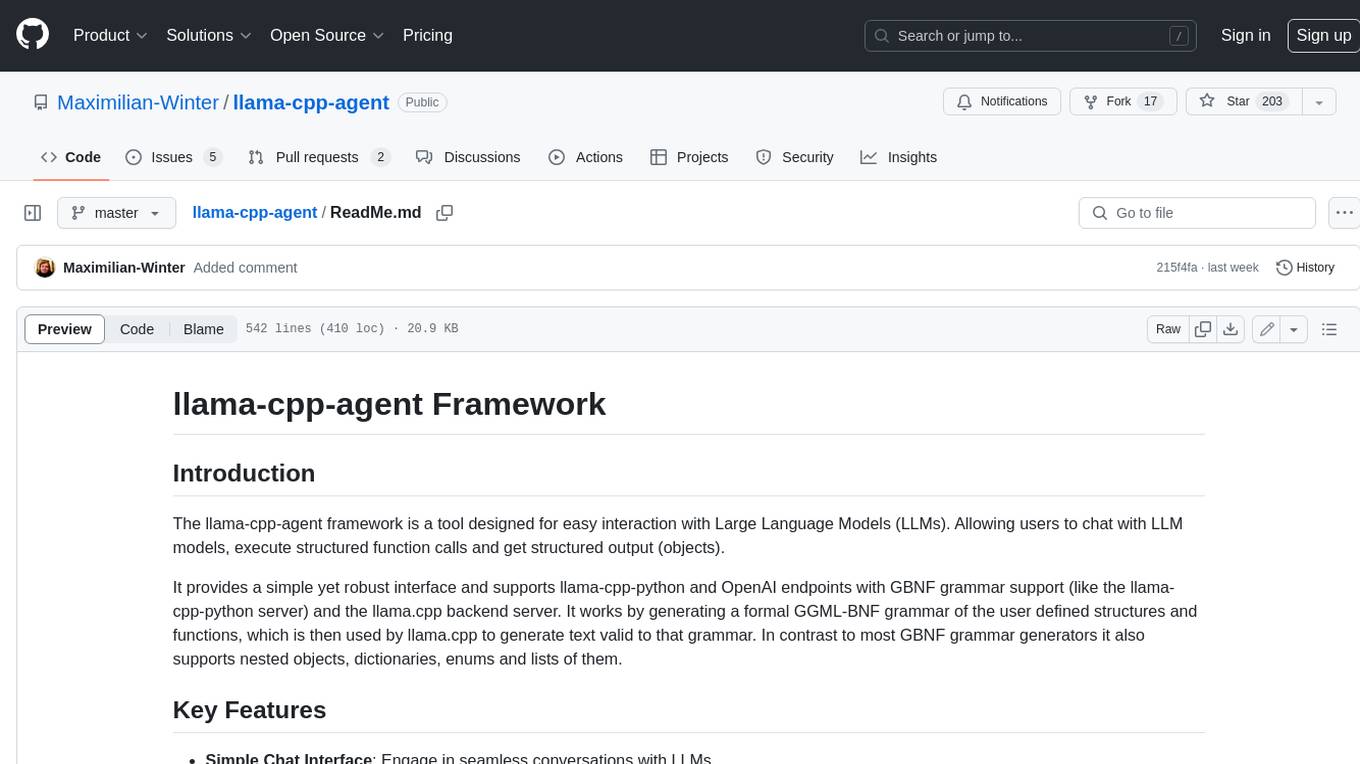
llama-cpp-agent
The llama-cpp-agent framework is a tool designed for easy interaction with Large Language Models (LLMs). Allowing users to chat with LLM models, execute structured function calls and get structured output (objects). It provides a simple yet robust interface and supports llama-cpp-python and OpenAI endpoints with GBNF grammar support (like the llama-cpp-python server) and the llama.cpp backend server. It works by generating a formal GGML-BNF grammar of the user defined structures and functions, which is then used by llama.cpp to generate text valid to that grammar. In contrast to most GBNF grammar generators it also supports nested objects, dictionaries, enums and lists of them.
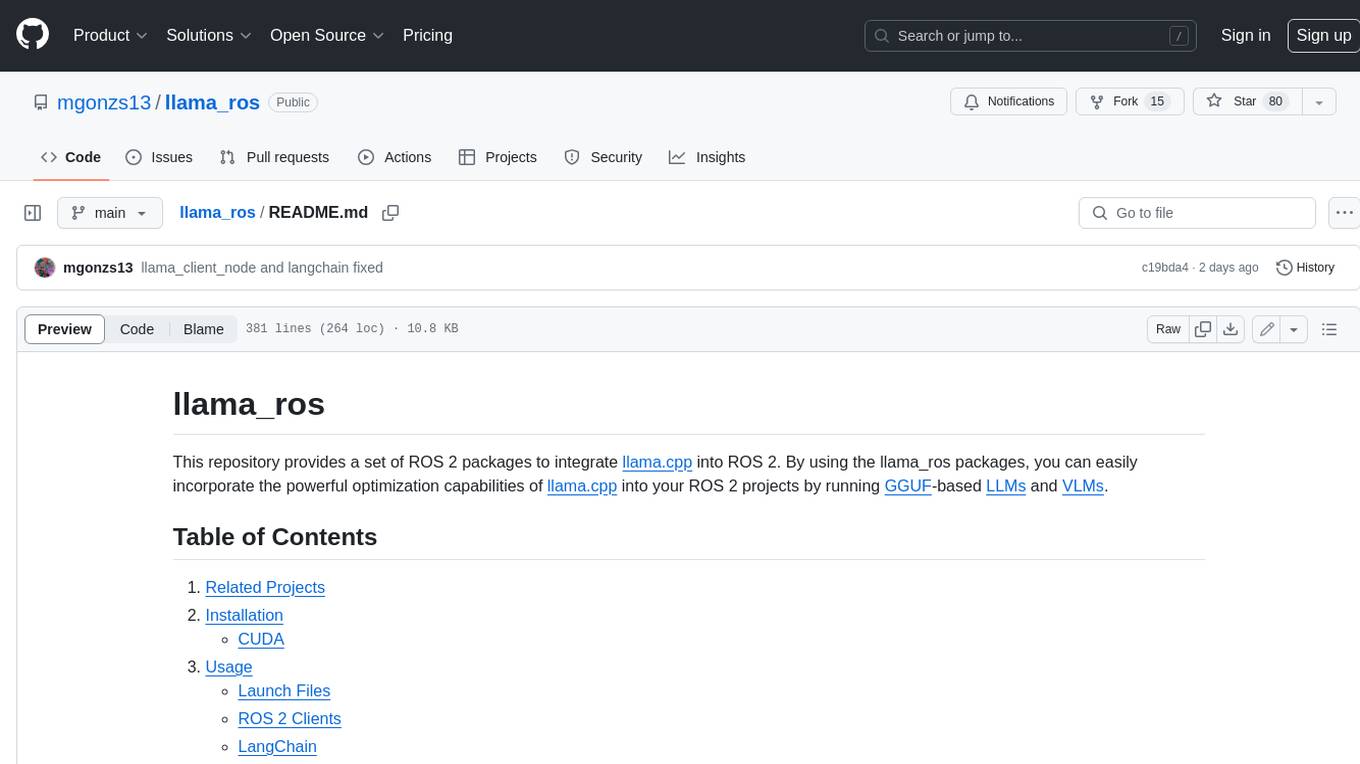
llama_ros
This repository provides a set of ROS 2 packages to integrate llama.cpp into ROS 2. By using the llama_ros packages, you can easily incorporate the powerful optimization capabilities of llama.cpp into your ROS 2 projects by running GGUF-based LLMs and VLMs.
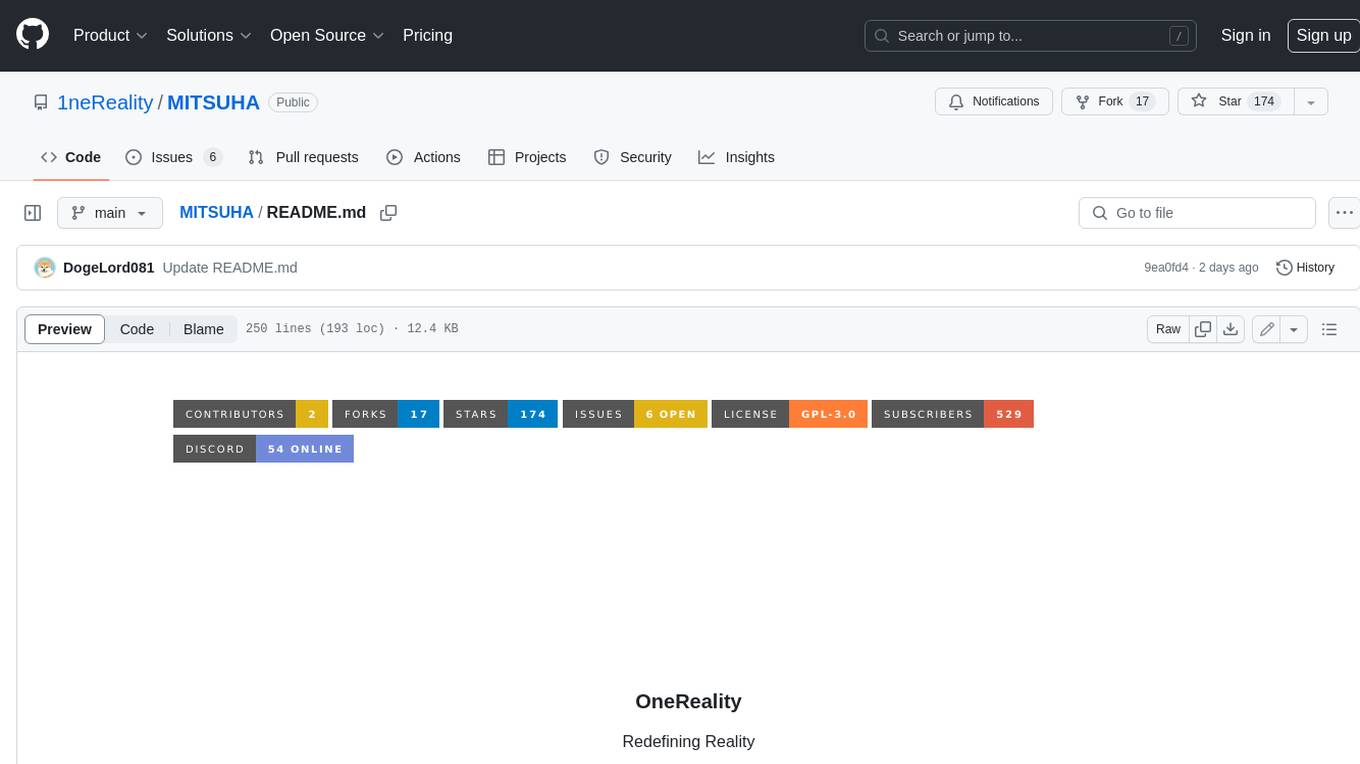
MITSUHA
OneReality is a virtual waifu/assistant that you can speak to through your mic and it'll speak back to you! It has many features such as: * You can speak to her with a mic * It can speak back to you * Has short-term memory and long-term memory * Can open apps * Smarter than you * Fluent in English, Japanese, Korean, and Chinese * Can control your smart home like Alexa if you set up Tuya (more info in Prerequisites) It is built with Python, Llama-cpp-python, Whisper, SpeechRecognition, PocketSphinx, VITS-fast-fine-tuning, VITS-simple-api, HyperDB, Sentence Transformers, and Tuya Cloud IoT.
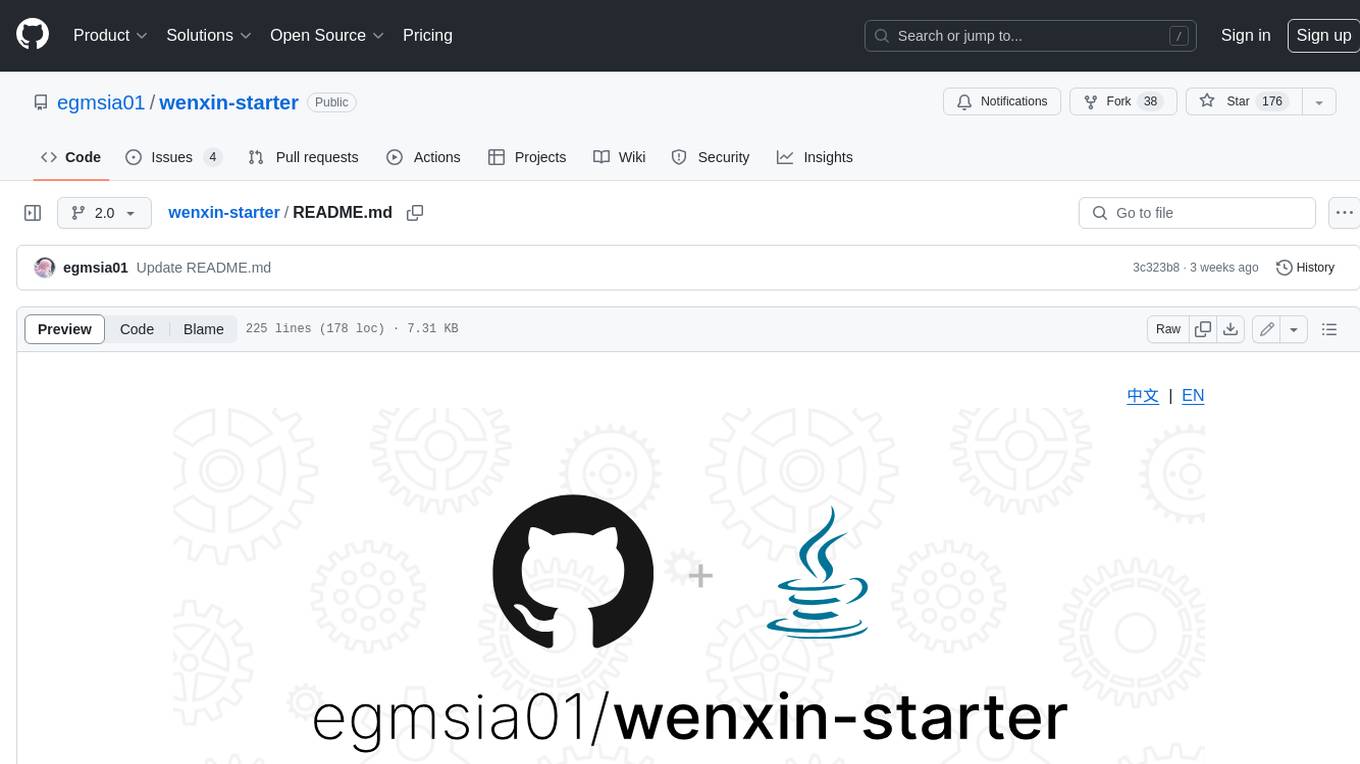
wenxin-starter
WenXin-Starter is a spring-boot-starter for Baidu's "Wenxin Qianfan WENXINWORKSHOP" large model, which can help you quickly access Baidu's AI capabilities. It fully integrates the official API documentation of Wenxin Qianfan. Supports text-to-image generation, built-in dialogue memory, and supports streaming return of dialogue. Supports QPS control of a single model and supports queuing mechanism. Plugins will be added soon.
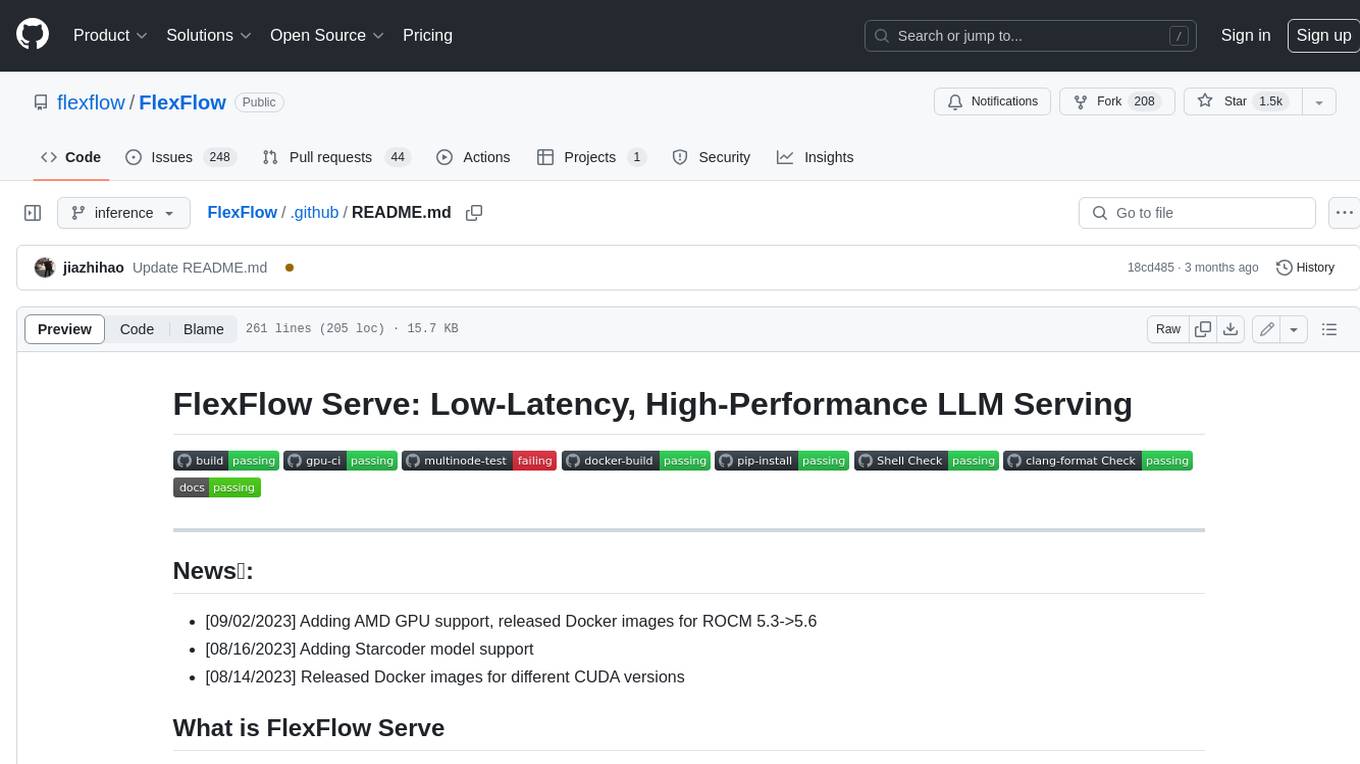
FlexFlow
FlexFlow Serve is an open-source compiler and distributed system for **low latency**, **high performance** LLM serving. FlexFlow Serve outperforms existing systems by 1.3-2.0x for single-node, multi-GPU inference and by 1.4-2.4x for multi-node, multi-GPU inference.





